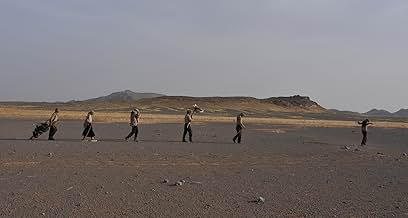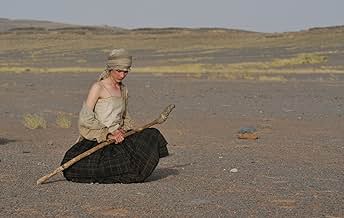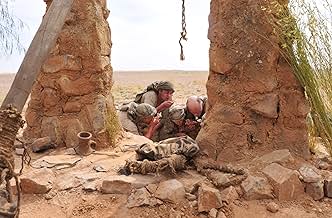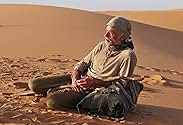Os fugitivos do gulag siberiano viajam quatro mil milhas a pé para a liberdade na Índia.Os fugitivos do gulag siberiano viajam quatro mil milhas a pé para a liberdade na Índia.Os fugitivos do gulag siberiano viajam quatro mil milhas a pé para a liberdade na Índia.
- Direção
- Roteiristas
- Artistas
- Indicado a 1 Oscar
- 4 vitórias e 5 indicações no total
Gustaf Skarsgård
- Voss
- (as Gustaf Skarsgard)
Zachary Baharov
- Interrogator
- (as Zahari Baharov)
Sally Brunski
- Janusz's Wife, 1939
- (as Sally Edwards)
Dejan Angelov
- Andrei
- (as Deyan Angelov)
Mariy Rosen
- Lazar
- (as Marii Grigorov)
Nikolay Stanoev
- Yuri
- (as Nikolai Stanoev)
- Direção
- Roteiristas
- Elenco e equipe completos
- Produção, bilheteria e muito mais no IMDbPro
Avaliações em destaque
The story of a small group of people escaping from a Siberian Soviet prison, part of the "Gulag" in wartime and walking 4000 miles to freedom looked a trifle grim in the trailer, but Peter Weir has managed to produce a rather beautiful film out of it, using Bulgaria and Morocco as locales rather than Siberia and the Gobi desert. Only Darjeeling in India plays itself. My only trouble with it is the rather uneven character development. The story lends itself to ensemble playing but we learn little about two or three of the walkers. In the case of the lead character Janusz (Jim Sturgess) who is the source of the story this is explicable as we are seeing the others though his eyes, but it has to be said that both "Mr Smith" (the excellent Ed Harris) and the Girl (Saiorse Ronan) leave a lasting impression.
I know there is some doubt as to the authenticity of the story, taken from a 1955 book by Slavimir Rawicz a former Polish army officer, and indeed what the group are supposed to have done looks impossible but that's not a problem, because the relationships ring true. It is remarkable how an almost random collection of individuals, including one with a very unsavoury past, can, driven by sheer necessity, wind up functioning as a team. Partly this is due to the leader actually having some navigational knowledge and therefore inspiring confidence in the others. Mr Smith remarks early on that the Janusz has a serious weakness; he is kind, but when the chips are down we see that even the hard-bitten Mr Smith is capable of compassion.
Strangely enough, after the initial scenes in the prison camp, and the escape, there is not a lot of drama. The group encounter very few people on their travels and those they do meet take little interest in them (perhaps they had not heard about the bounty for escapees). Obtaining food and water is obviously a big issue, so mind out for the messy hunting scenes. I was astounded at how well their footwear stood up to the punishment; my hiking boots are not good for 400 miles let alone 4000. Actually they must have wandered around a bit - the northern end of Lake Baikal and Lhasa in Tibet are about 1800 miles apart, though the prison camp was somewhere north of the lake. It's also not clear how long the walk took, but at times it seemed like years. Weir's great achievement is to keep us watching a very drawn out tale. Personally I think I would have died of boredom if I had been in this particular walk, if starvation hadn't got me first.
I know there is some doubt as to the authenticity of the story, taken from a 1955 book by Slavimir Rawicz a former Polish army officer, and indeed what the group are supposed to have done looks impossible but that's not a problem, because the relationships ring true. It is remarkable how an almost random collection of individuals, including one with a very unsavoury past, can, driven by sheer necessity, wind up functioning as a team. Partly this is due to the leader actually having some navigational knowledge and therefore inspiring confidence in the others. Mr Smith remarks early on that the Janusz has a serious weakness; he is kind, but when the chips are down we see that even the hard-bitten Mr Smith is capable of compassion.
Strangely enough, after the initial scenes in the prison camp, and the escape, there is not a lot of drama. The group encounter very few people on their travels and those they do meet take little interest in them (perhaps they had not heard about the bounty for escapees). Obtaining food and water is obviously a big issue, so mind out for the messy hunting scenes. I was astounded at how well their footwear stood up to the punishment; my hiking boots are not good for 400 miles let alone 4000. Actually they must have wandered around a bit - the northern end of Lake Baikal and Lhasa in Tibet are about 1800 miles apart, though the prison camp was somewhere north of the lake. It's also not clear how long the walk took, but at times it seemed like years. Weir's great achievement is to keep us watching a very drawn out tale. Personally I think I would have died of boredom if I had been in this particular walk, if starvation hadn't got me first.
This is a wonderful film that is completely unpretentious, has no explosions, maltreated corpses or dramatic emotional outbursts, but a stringent and focused narrative, good camera work and above all great actors, all together as an ensemble. And even though we know that Ed Harris and Colin Farrell are always worth their money, especially Farrell as a Russian criminal is an absolute highlight. How he goes from being brutal, then self-doubting to a social being is very well directed by Peter Weir, but played by Farrell in a truly stunning way. Halfway through the film, a fresh, new color comes into play with Saoirse Ronan. Weir builds up the story well, maybe the hike through the Himalayas is a little too short, but at that point we already understood what drives the small troop of survivalists. A true gem.
90U
I think it's always difficult to portray hardship and endurance in films purely because you only experience it for a couple of hours or so. This had me understanding the terrible conditions for real....i think. The search for water in the Gobi desert had me thinking twice about attempting the same thing as a holiday. Make up was fantastic and the bleakness of the scenery was soo beautiful
Having read several books about escapes from Siberia, I was interested in seeing one of them put on screen. I say this because the film is a bit slow in a number of parts so it helps to have a great interest in the subject matter. The film isn't boring - at least, to me - but I can see some people seeing it that way, especially if you're used to today's action movies.
The scenery is magnificent and some of the shots by director Peter Weir are jaw-dropping. This is Weir's first film since the 2003 "Master And Commander: The Far Side Of The World." The man does quality work.
Ed Harris one of the few, if not only, actors in here whose English you can clearly understand, so it's a good idea to play this DVD with subtitles. You get a fair of amount of subtitles with the Russian characters, anyway, but none are distracting from the scenery or story. The characters and acting in here are good, too.
If this subject matter interests you, find the book, "As Far As My Feet Will Carry Me," about a one-man escape from a Siberian Labor Camp following WWII.
The scenery is magnificent and some of the shots by director Peter Weir are jaw-dropping. This is Weir's first film since the 2003 "Master And Commander: The Far Side Of The World." The man does quality work.
Ed Harris one of the few, if not only, actors in here whose English you can clearly understand, so it's a good idea to play this DVD with subtitles. You get a fair of amount of subtitles with the Russian characters, anyway, but none are distracting from the scenery or story. The characters and acting in here are good, too.
If this subject matter interests you, find the book, "As Far As My Feet Will Carry Me," about a one-man escape from a Siberian Labor Camp following WWII.
So the book has been proved false. Does this mean that the "true story" isn't true after all? There have been many claims by others that it is fact instead of fiction. Whatever - it doesn't matter, Peter Weir's "The Way Back", this movie about that book, which tells the tale of gulag escapees and their harrowing journey to freedom, is a well-told and inspiring tale than anything else.
All of the actors are terrific in their roles - Jim Sturgess as the de- facto leader of the bunch, showing a more improved and mature side to his acting since "21"; Ed Harris as the gruff American Smith, who is hard-edged and iron-willed until he eventually befriends...; Saiorse Ronan as Irene, the runaway girl who joins them on their quest - Ronan here shows a perfect balance of various emotions while not overdoing it like many child stars her age... she definitely is one of the best young actresses today; Colin Farrell as the violent yet humorous soldier who protects the team from danger in Siberia and provides comic relief when needed - Farrell shows that he can be tough yet likable at the same time without being completely overblown and shows his versatility as an actor; European actors Dragos Bucur, Alexandru Potocean, Sebastian Urzendowsky and Gustaf Skarsgård round off the remaining escapees and they all acted great in their respective and differing roles. The chemistry between all of the actors at parts are great.
Having said that, the film's only flaw is that it sacrificed substantial characterization for realism and visual spectacles. The characters are thinly but not overly so fleshed out, and the interactions between them are short before the next walking shot. But when it comes to realism and believability the film succeeds. I was surprised when I saw National Geographic was one of the co-producers of the film, but I wasn't as soon as I saw how realistic the depictions of survival the characters did in the film. Men will do anything to escape to freedom, and the determination and spirit to survive in a harsh and unforgiving natural world, is what Weir and his script is trying to say, but the walking parts are written in masterful detail that any line of dialog may ruin it, so silence is sometimes golden in these parts. The screenplay also challenges the usual Hollywood clichés that usually are found in this film genre, and it transforms them into better, more realistic and sometimes unsettling situations.
Production-wise, the film is a triumph. The production design is great and makes extremely well use of real locations. The cinematography by Russell Boyd is dazzling, simply marvelous, it is wide, sweeping and epic, with lush scenery of forests, deserts and the snow-peaked Himalayas exquisitely shot throughout. The wide cinematography makes the experience even more harrowing thanks to Lee Smith's fluid and crisp editing and Burkhard Dallwitz's great music score and terrific music timing - Dallwitz and Weir know when and how music/sound can be used in a scene, and that sometimes, silence is crucial to certain moments. Here, Weir uses that silence to terrific and very intense effect, and with his extremely focused direction, manages to being out a very exhilarating and at the same time excruciating (in a good way) experience. So much so that I forgot about the controversy surrounding the "true story" and found myself hugely engrossed in the movie, not wanting it to end.
In short, the film lightly suffers from lack of proper characterization, but is heavy on almost everything else - acting, directing, cinematography, production value and music. If it had proper characterization, it would have been an instant classic and a contender for the Best Picture Oscar. Still, as it stands, "The Way Back" is still an epic adventure; an inspiring, sometimes funny, and often intense and harrowing experience that also proves that Peter Weir is still an ambitious tour-de-force filmmaker.
Overall rating: 77/100
All of the actors are terrific in their roles - Jim Sturgess as the de- facto leader of the bunch, showing a more improved and mature side to his acting since "21"; Ed Harris as the gruff American Smith, who is hard-edged and iron-willed until he eventually befriends...; Saiorse Ronan as Irene, the runaway girl who joins them on their quest - Ronan here shows a perfect balance of various emotions while not overdoing it like many child stars her age... she definitely is one of the best young actresses today; Colin Farrell as the violent yet humorous soldier who protects the team from danger in Siberia and provides comic relief when needed - Farrell shows that he can be tough yet likable at the same time without being completely overblown and shows his versatility as an actor; European actors Dragos Bucur, Alexandru Potocean, Sebastian Urzendowsky and Gustaf Skarsgård round off the remaining escapees and they all acted great in their respective and differing roles. The chemistry between all of the actors at parts are great.
Having said that, the film's only flaw is that it sacrificed substantial characterization for realism and visual spectacles. The characters are thinly but not overly so fleshed out, and the interactions between them are short before the next walking shot. But when it comes to realism and believability the film succeeds. I was surprised when I saw National Geographic was one of the co-producers of the film, but I wasn't as soon as I saw how realistic the depictions of survival the characters did in the film. Men will do anything to escape to freedom, and the determination and spirit to survive in a harsh and unforgiving natural world, is what Weir and his script is trying to say, but the walking parts are written in masterful detail that any line of dialog may ruin it, so silence is sometimes golden in these parts. The screenplay also challenges the usual Hollywood clichés that usually are found in this film genre, and it transforms them into better, more realistic and sometimes unsettling situations.
Production-wise, the film is a triumph. The production design is great and makes extremely well use of real locations. The cinematography by Russell Boyd is dazzling, simply marvelous, it is wide, sweeping and epic, with lush scenery of forests, deserts and the snow-peaked Himalayas exquisitely shot throughout. The wide cinematography makes the experience even more harrowing thanks to Lee Smith's fluid and crisp editing and Burkhard Dallwitz's great music score and terrific music timing - Dallwitz and Weir know when and how music/sound can be used in a scene, and that sometimes, silence is crucial to certain moments. Here, Weir uses that silence to terrific and very intense effect, and with his extremely focused direction, manages to being out a very exhilarating and at the same time excruciating (in a good way) experience. So much so that I forgot about the controversy surrounding the "true story" and found myself hugely engrossed in the movie, not wanting it to end.
In short, the film lightly suffers from lack of proper characterization, but is heavy on almost everything else - acting, directing, cinematography, production value and music. If it had proper characterization, it would have been an instant classic and a contender for the Best Picture Oscar. Still, as it stands, "The Way Back" is still an epic adventure; an inspiring, sometimes funny, and often intense and harrowing experience that also proves that Peter Weir is still an ambitious tour-de-force filmmaker.
Overall rating: 77/100
Você sabia?
- CuriosidadesThis movie was inspired by the memoir of Slavomir Rawicz depicting his escape from a Siberian gulag and subsequent four thousand-mile walk to freedom in India. Incredibly popular, it sold over five hundred thousand copies, and is credited with inspiring many explorers. However, in 2006, the BBC unearthed records (including some written by Rawicz) that showed he had been released by the U.S.S.R. in 1942. In 2009, another former Polish soldier, Witold Glinski, claimed that the book was really an account of his own escape. However, this claim too has been seriously challenged.
- Erros de gravaçãoJanusz demonstrates a method using shadows of a stick and rock to find the compass direction of south. Yet, many of the scenes show them walking in a direction inconsistent with sun angles i.e. sun at their backs, which would have them walking north.
- ConexõesFeatured in Breakfast: Episode dated 7 December 2010 (2010)
Principais escolhas
Faça login para avaliar e ver a lista de recomendações personalizadas
Detalhes
- Data de lançamento
- Países de origem
- Idiomas
- Também conhecido como
- Camino a la libertad
- Locações de filme
- Empresas de produção
- Consulte mais créditos da empresa na IMDbPro
Bilheteria
- Orçamento
- US$ 30.000.000 (estimativa)
- Faturamento bruto nos EUA e Canadá
- US$ 2.701.859
- Fim de semana de estreia nos EUA e Canadá
- US$ 1.218.868
- 23 de jan. de 2011
- Faturamento bruto mundial
- US$ 24.172.201
- Tempo de duração
- 2 h 13 min(133 min)
- Cor
- Mixagem de som
- Proporção
- 2.35 : 1
Contribua para esta página
Sugerir uma alteração ou adicionar conteúdo ausente




































